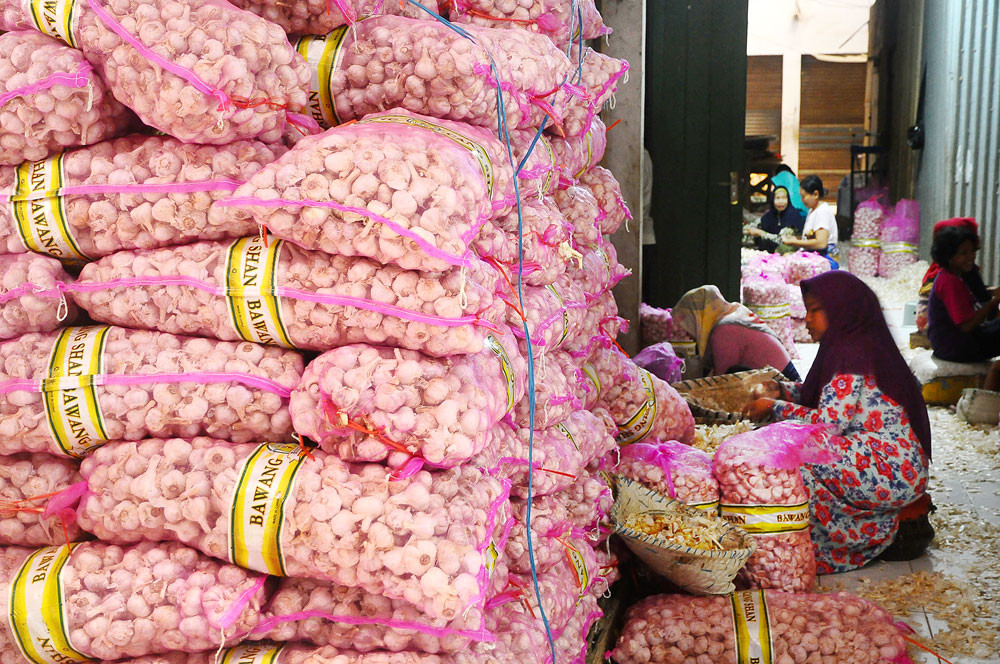Popular Reads
Top Results
Can't find what you're looking for?
View all search resultsPopular Reads
Top Results
Can't find what you're looking for?
View all search resultsAgriculture Ministry recommends importing more garlic as demand surges
With garlic prices already soaring since the start of 2020, the ministry is now seeking not only to stabilize prices but also to mitigate the impacts of disruption to the logistics sector caused by the unfolding COVID-19 pandemic.
Change text size
Gift Premium Articles
to Anyone
A
s of last month, the Agriculture Ministry has issued recommendations to import more than 460,000 tons of garlic to ensure sufficient supplies and stabilize soaring prices during Ramadan and Idul Fitri when food demand usually surges.
Between March and May, the government actually needs to procure only around 196,000 tons from overseas to meet demand at home, said Agriculture Minister Syahrul Yasin Limpo. Coupled with domestic production, the ministry estimates there will be a surplus of more than 116,000 tons at the end of May.
Speaking during an online hearing with House of Representatives Commission IV overseeing food and agriculture on April 16, Sharul said the garlic imports were necessary to stabilize prices during Ramadan, which will begin April 23. “With the current stock, we expect it will be under control and safe, god willing, at least until Idul Fitri,” he said.
With garlic prices already soaring since the start of 2020, the ministry is now seeking not only to stabilize prices but also to mitigate the impacts of disruption to the logistics sector caused by the unfolding COVID-19 pandemic.
The average price of garlic rose roughly 30 percent to Rp 44,900 per kilogram from January to March, according to data from the Information Center for Strategic Food Prices (PIHPS), the government’s food price tracker.
This is well above President Joko “Jokowi” Widodo’s preferred price range of between Rp 20,000 and Rp 30,000 per kilogram.
Domestic garlic production is also expected to increase in the coming months as Temanggung in Central Java, the country’s center of garlic production, is now in the middle of harvest season.
Last year, the regency’s harvest yielded more than 24,000 tons, or 27 percent of national production.
With a garlic shortage at home and demand surging ahead of Ramadan, the Trade Ministry issued last month a regulation to allow companies to import garlic from overseas without having to obtain a permit.
As of April 16, 34 containers carrying 29 tons of garlic each had arrived at Tanjung Priok port in North Jakarta from China, the world's largest garlic producer, said Trade Minister Agus Suparmanto.
“Based on Trade Ministerial Regulation No. 27/2020, local companies can import without a permit until June 30,” Trade Ministry Domestic Trade Director General Suhanto told The Jakarta Post via text message on Thursday.
With the rupiah depreciating against the United States dollar and the COVID-19 pandemic disrupting logistics, importing garlic from China is not only more expensive but also more difficult, according to the Indonesian Onions and Root Vegetables Entrepreneurs (Pusbarindo) trade association.
China, where the SARS-CoV-2 virus first emerged in late December, has ended its massive lockdown measures. However, business activities have not fully recovered.
“Even in normal times […] it was difficult for companies to fulfill 100 percent [of the permitted import volumes] in one or two months,” Pusbarindo chairman Valention told the Post in a phone interview on Thursday. “Moreover, financial capacity varies from one firm to another.”
According to data from the Agriculture Ministry, garlic imports declined by around 20 percent to more than 465,000 tons between 2018 and 2019.










